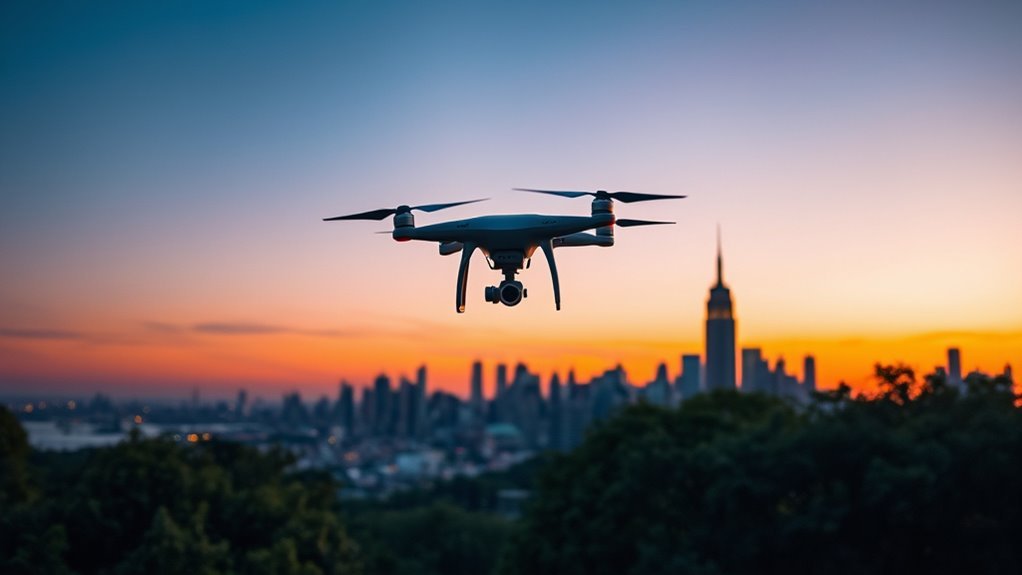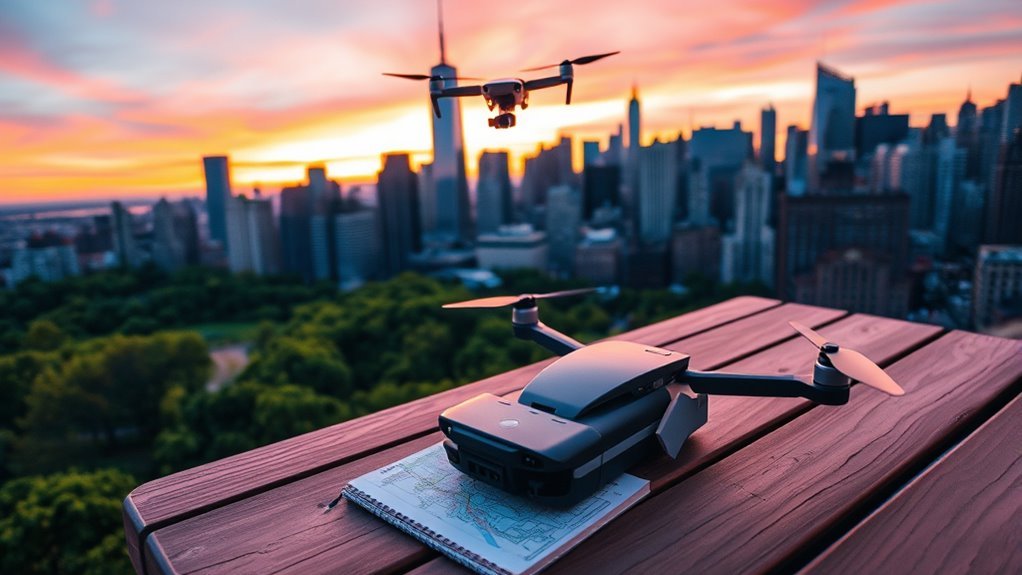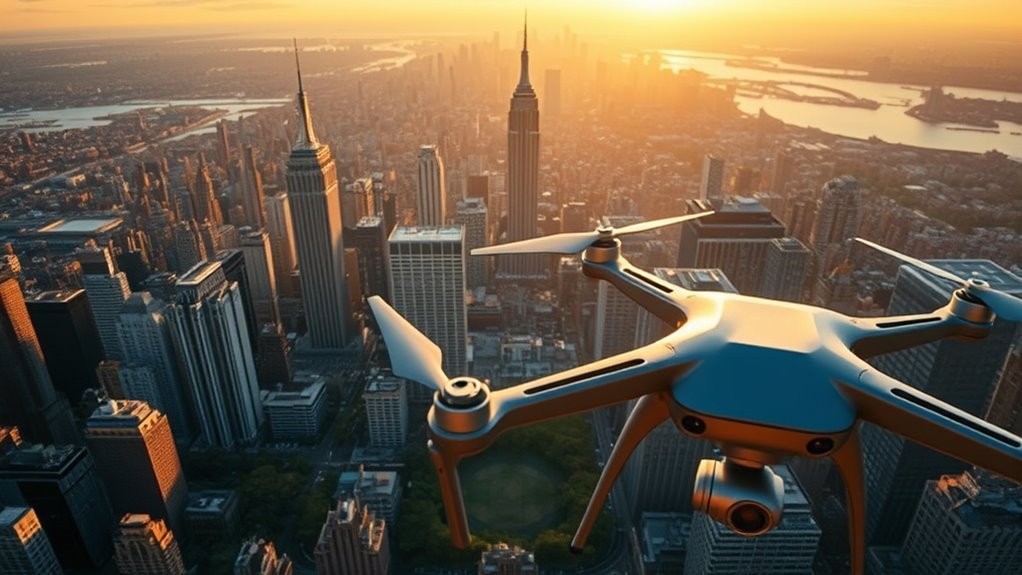Maneuvering drone legality in New York requires you to understand federal regulations, including FAA registration for drones over 0.55 pounds, and local laws that may restrict usage in public spaces. It’s essential to be aware of no-fly zones, especially near airports, and to maintain visibility during flights. Additionally, check state-specific rules and comply with safety guidelines to avoid legal issues. Stay informed to guarantee a smooth flying experience and discover more about enhancing your knowledge.
Overview of Drone Regulations in New York

While maneuvering the skies in New York, it’s essential to understand the regulations governing drone use. First, you’ll need to obtain proper drone permits, which are mandatory for commercial operations and recommended for recreational use. This guarantees you’re compliant with state laws and local ordinances. Additionally, securing drone insurance is critical; it protects you from potential liabilities, offering peace of mind while you fly. Familiarize yourself with no-fly zones, especially near airports and sensitive areas like government buildings. Adhering to altitude limits and maintaining visual line of sight is also essential. By understanding these regulations, you can enjoy your flying experience while exercising your freedom responsibly, minimizing risks associated with drone operations in New York.
Federal Drone Laws and Guidelines

Understanding federal drone laws is important for anyone operating drones in New York. The Federal Aviation Administration (FAA) sets federal regulations that govern drone usage nationwide, and compliance is essential for your freedom to fly. You’ll need to register your drone if it weighs over 0.55 pounds and adhere to guidelines regarding airspace restrictions, altitude limits, and no-fly zones. Drone enforcement is strict; violations can lead to fines and legal repercussions. Familiarizing yourself with the FAA’s Part 107 rules for commercial operations or the recreational guidelines for hobbyists is critical. Knowledge of federal laws not only guarantees safe operation but also protects your rights as a drone operator in the ever-evolving landscape of aerial technology.
State-Specific Drone Regulations

As you navigate the complexities of drone operation in New York, it’s crucial to recognize that state-specific regulations can greatly impact your flying experience. To guarantee you’re compliant and maximize your freedom in the skies, consider these key points:
- Drone Insurance: New York doesn’t mandate drone insurance, but having it is wise, especially for commercial users engaging in drone photography.
- Altitude Limits: Be aware that New York has specific altitude regulations, typically capping flights at 400 feet above ground level.
- Restricted Areas: Certain zones, like near airports and government buildings, have strict restrictions on drone use, so check local maps before flying.
Understanding these regulations will help you enjoy your drone photography while staying within legal boundaries.
Local Ordinances Affecting Drone Use
When flying drones in New York, you need to be aware of city-specific restrictions that can vary considerably from one municipality to another. Local noise and privacy laws may impose additional limitations on where and how you can operate your drone. Understanding these ordinances is essential to guarantee compliance and avoid potential fines or legal issues.
City-Specific Restrictions
While many drone enthusiasts enjoy the freedom of flying their devices, city-specific restrictions can complicate these experiences considerably. Local ordinances vary widely, especially in urban areas. Here are three key points to take into account:
- City Parks: Many cities prohibit drone use in public parks to guarantee safety and preserve the natural environment.
- Event Venues: Event venues often restrict drone flights to avoid disruptions and protect attendees, especially during large gatherings.
- No-Fly Zones: Familiarize yourself with no-fly zones that may include schools, hospitals, and government buildings to avoid legal issues.
Being aware of these restrictions will help you enjoy your drone flying while respecting local laws. Always check your city’s regulations before taking off.
Noise and Privacy Laws
Understanding noise and privacy laws is essential for drone operators in New York, especially since local ordinances can impose significant restrictions. Noise complaints are a common issue, as drones can produce sounds that disturb residential areas. Many municipalities have specific noise ordinances that dictate acceptable sound levels. You’ll need to familiarize yourself with these regulations to avoid fines or other penalties.
Additionally, privacy concerns are vital. New York has laws protecting individuals from unwanted surveillance, and flying drones over private property can lead to legal disputes. It’s important to respect personal boundaries and seek permission when necessary. By understanding these laws, you can navigate the complexities of drone operation while upholding both your rights and those of the community.
Registration Requirements for Drones
When operating a drone in New York, you’ll need to understand the registration requirements set by the FAA, which vary based on your drone’s weight classification. It’s vital to grasp the specific regulations that apply at both the federal and state levels to guarantee compliance. Failing to register your drone correctly could lead to penalties, so knowing the process is critical.
FAA Registration Process
To legally operate a drone in the United States, including New York, you’ll need to navigate the FAA registration process, which applies to all unmanned aircraft weighing more than 0.55 pounds. Understanding this process is essential for ensuring your freedom to fly without legal issues. Here’s what you need to know about FAA registration for different drone categories:
- Eligibility: You must be at least 13 years old to register.
- Cost: The registration fee is $5 and is valid for three years.
- Process: Complete the registration online at the FAA’s website and receive a unique registration number.
Weight Classifications Explained
Drones fall into several weight classifications, which directly influence their registration requirements and legal operation in New York. Generally, drones under 0.55 pounds (250 grams) don’t require FAA registration, allowing you more freedom for casual use. However, if your drone exceeds this limit, including its payloads, you’ll need to register it. Drones weighing between 0.55 pounds and 55 pounds must be registered with the FAA, ensuring you’re aware of the weight limits and regulations that apply. For those weighing over 55 pounds, the requirements can become more stringent, often necessitating additional certifications. Understanding these classifications is essential to navigate the legal landscape effectively and enjoy the freedom of flying your drone responsibly.
State-Specific Regulations
Although federal regulations provide a basic framework for drone operation, New York has its own specific registration requirements that you need to take into account. To operate your drone legally in New York, consider the following:
- Registration: All drones over 0.55 pounds must be registered with the FAA. New York doesn’t have additional state registration but complying with federal laws is essential.
- Insurance: While not always mandatory, obtaining drone insurance is highly recommended to protect yourself against potential liabilities.
- Hobbyist Guidelines: If you’re flying for fun, adhere to the FAA’s hobbyist guidelines, including maintaining visual line-of-sight and flying below 400 feet.
Airspace Restrictions and No-Fly Zones
When flying a drone in New York, understanding airspace restrictions and no-fly zones is vital for compliance and safety. Familiarize yourself with airspace mapping to identify where you can and can’t operate your drone. Major drone zones, such as near airports, government buildings, and crowded areas, often have specific limitations. It’s imperative to check local regulations, as these can vary markedly across the state. Use apps and resources that provide real-time updates on no-fly zones to guarantee you’re aware of changing airspace conditions. By staying informed, you can enjoy the freedom of flying while respecting the laws designed to maintain public safety and privacy. Always prioritize compliance to avoid fines and penalties.
Safety Guidelines for Drone Operation
Understanding safety guidelines for drone operation is crucial to guarantee both your safety and the safety of others. Following these guidelines guarantees a smooth flying experience while adhering to legal requirements. Here are three essential safety tips you should always consider:
- Pre Flight Checklist: Before launching, inspect your drone’s battery, propellers, and camera to confirm everything’s in proper working order.
- Maintain Visual Line of Sight: Always keep your drone within your visual line of sight to avoid collisions and maintain control.
- Emergency Procedures: Familiarize yourself with emergency procedures, such as what to do if your drone loses signal or experiences a malfunction. Additionally, understanding local drone regulations will help ensure that your flight operations are compliant and secure.
Consequences of Non-Compliance With Drone Laws
Failing to comply with drone laws in New York can lead to serious legal consequences that may affect both your finances and your ability to operate a drone in the future. The legal penalties for violations can be steep, ranging from fines to potential criminal charges, depending on the severity of the infraction. This could hinder your freedom to fly your drone, as repeat offenders face harsher consequences. Additionally, you may incur civil liabilities if your drone causes damage to property or injures someone, leading to costly lawsuits. Understanding these repercussions is crucial for maintaining your rights as a drone operator while ensuring you respect the laws designed to protect public safety and privacy.
Frequently Asked Questions
Can I Fly a Drone at Night in New York?
You can fly a drone at night in New York, but you must follow night flying regulations. Make certain your drone has proper light requirements, like anti-collision lights, to maintain safety and compliance with FAA guidelines.
What Are the Penalties for Flying Without Registration?
Flying without drone registration’s like driving without a license; the legal consequences can be steep. You could face hefty fines and potential confiscation of your drone, limiting your freedom to explore the skies.
Are There Any Age Restrictions for Flying Drones?
Yes, there are age restrictions for flying drones. You must be at least 13 years old for registration, ensuring drone safety and adherence to flying regulations. Always check local laws for additional restrictions or requirements.
Can I Use Drones for Commercial Purposes in All Areas?
You can’t use drones for commercial purposes in all areas due to commercial drone regulations and drone airspace restrictions. Always check local laws to verify you’re compliant and maximizing your freedom to operate safely.
How Do I Report a Drone Violation in My Area?
So, you’ve spotted a drone violating safety rules? You’d think it’s easy to report! First, gather evidence and contact local authorities, following established reporting procedures. Your vigilance helps maintain drone safety in your community.

